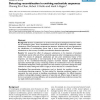Free Online Productivity Tools
i2Speak
i2Symbol
i2OCR
iTex2Img
iWeb2Print
iWeb2Shot
i2Type
iPdf2Split
iPdf2Merge
i2Bopomofo
i2Arabic
i2Style
i2Image
i2PDF
iLatex2Rtf
Sci2ools
119
Voted
BMCBI
2006
2006
Detecting recombination in evolving nucleotide sequences
Background: Genetic recombination can produce heterogeneous phylogenetic histories within a set of homologous genes. These recombination events can be obscured by subsequent residue substitutions, which consequently complicate their detection. While there are many algorithms for the identification of recombination events, little is known about the effects of subsequent substitutions on the accuracy of available recombination-detection approaches. Results: We assessed the effect of subsequent substitutions on the detection of simulated recombination events within sets of four nucleotide sequences under a homogeneous evolutionary model. The amount of subsequent substitutions per site, prior evolutionary history of the sequences, and reciprocality or non-reciprocality of the recombination event all affected the accuracy of the recombination-detecting programs examined. Bayesian phylogenetic-based approaches showed high accuracy in detecting evidence of recombination event and in identify...
Related Content
| Added | 10 Dec 2010 |
| Updated | 10 Dec 2010 |
| Type | Journal |
| Year | 2006 |
| Where | BMCBI |
| Authors | Cheong Xin Chan, Robert G. Beiko, Mark A. Ragan |
Comments (0)

